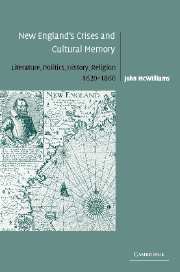Book contents
- Frontmatter
- Contents
- Acknowledgments
- Introduction: Crisis rhetoric: exclusion in New England history
- PART ONE PLANTATION AND SETTLEMENT
- 1 Of corn, no corn, and Christian courage
- 2 Thomas Morton: phoenix of New England memory
- 3 Trying Anne
- PART TWO TIME OF TROUBLES
- PART THREE REVOLUTION
- Epilogue: “bodiless echoes”
- Notes
- Index
1 - Of corn, no corn, and Christian courage
Published online by Cambridge University Press: 22 September 2009
- Frontmatter
- Contents
- Acknowledgments
- Introduction: Crisis rhetoric: exclusion in New England history
- PART ONE PLANTATION AND SETTLEMENT
- 1 Of corn, no corn, and Christian courage
- 2 Thomas Morton: phoenix of New England memory
- 3 Trying Anne
- PART TWO TIME OF TROUBLES
- PART THREE REVOLUTION
- Epilogue: “bodiless echoes”
- Notes
- Index
Summary
For understandable reasons, New England's first crisis – its Starving Time – has remained its least considered and least remembered communal trial. From the 1820s until at least midway through this century, young America was to be invoked by prominent New England historians both as a land of limitless natural bounty and as a state whose true spiritual glory was yet to be. Because land and republicanism were forces forever beckoning progressive Euro-Americans, the Anglo-American had to be freed from late medievalism, the Indian had to be (unjustly) dispossessed, then removed, and the Negro had to be (justly) freed into a position of political equality quite consonant with social inferiority. Under such circumstances, the past crises through which America had emerged were likely to seem political, economic, racial, and religious in kind. When Merry Mounters, Antinomians, Indians, and royalist placemen were looming immediately over the New England historical horizon, why linger over the hunger trials of first settlement? The new land's natural bounty had not been initially abundant, to be sure, but the widespread feeling that it should have been served to divert historical attention elsewhere.
In the eyes of such influential national historians as George Bancroft, Henry Adams, and Samuel Eliot Morison the great republic had emerged from a two-hundred-year mingling, a long unplanned working together, of the best traditions of Virginia and New England, but with New England subtly granted primacy.
- Type
- Chapter
- Information
- New England's Crises and Cultural MemoryLiterature, Politics, History, Religion, 1620–1860, pp. 23 - 43Publisher: Cambridge University PressPrint publication year: 2004

